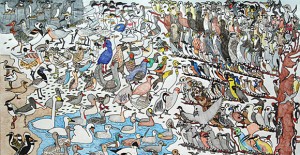Autism 101: An Uncle and Aunt’s Guide
The moment you find out that your niece or nephew has been diagnosed with autism or autism related spectrum disorders (ASDs), your world can suddenly seem overwhelming. As a dedicated uncle or aunt, you want to make sure you can support your family by getting informed and learning about the disorder. But as a person that is not familiar autism at all, where do you even begin to sift through the mountain of research and information out there?
First off, it’s essential that you educate yourself on the cause and history of autism; a neural disorder which happens to affect 11 in every 1,000 children born in the United States. Autism is a disability that affects verbal and nonverbal communication, as well as social interaction. Many times, children are diagnosed by the age of 3; most parents seek professional help when their child experiences a delay in communication. Although the developmental disorder can have a serious impact on the educational performance of your niece or nephew, it’s important to understand that their ability to function in society will depend on the severity of the disorder. In mild cases of autism, the child can continue to attend their school but will need additional assistance in some areas, such as speech and language. In other cases, children will need to undergo rigorous applied behavioral analysis (ABA) treatment and therapy.

Autism is unique in every child. Some children are high gifted with incredible intellectual and memorization skills, while others are more creative.
Although the exact cause of autism has yet to be discovered, researchers believe that the disorder stems from genetics, and environmental factors such as chemicals or viruses exposed to the mother during their child’s brain development. You may have already begun to notice that your niece or nephew engages in repetitive exercises and movements, is resistant to change in daily activities, and has different responses to sensory experiences compared to non-autistic children; this behavior is typical of a child with autism or autism related spectrum disorders. Because your niece or nephew will be challenged on a daily basis when it comes to social interaction, processing information, and learning through traditional teaching methods, it’s essential that your family seek professional treatment or therapy to ensure that your autistic niece or nephew has a bright future. Many people incorrectly assume that autism is purely a disability – in fact, many times, children born with the disorder can have amazing abilities such as creative problem solving skills and musical or artistic talents. We encourage you to work closely with your family’s therapist to learn what teaching methods and behavior will be most beneficial for your specific case.

